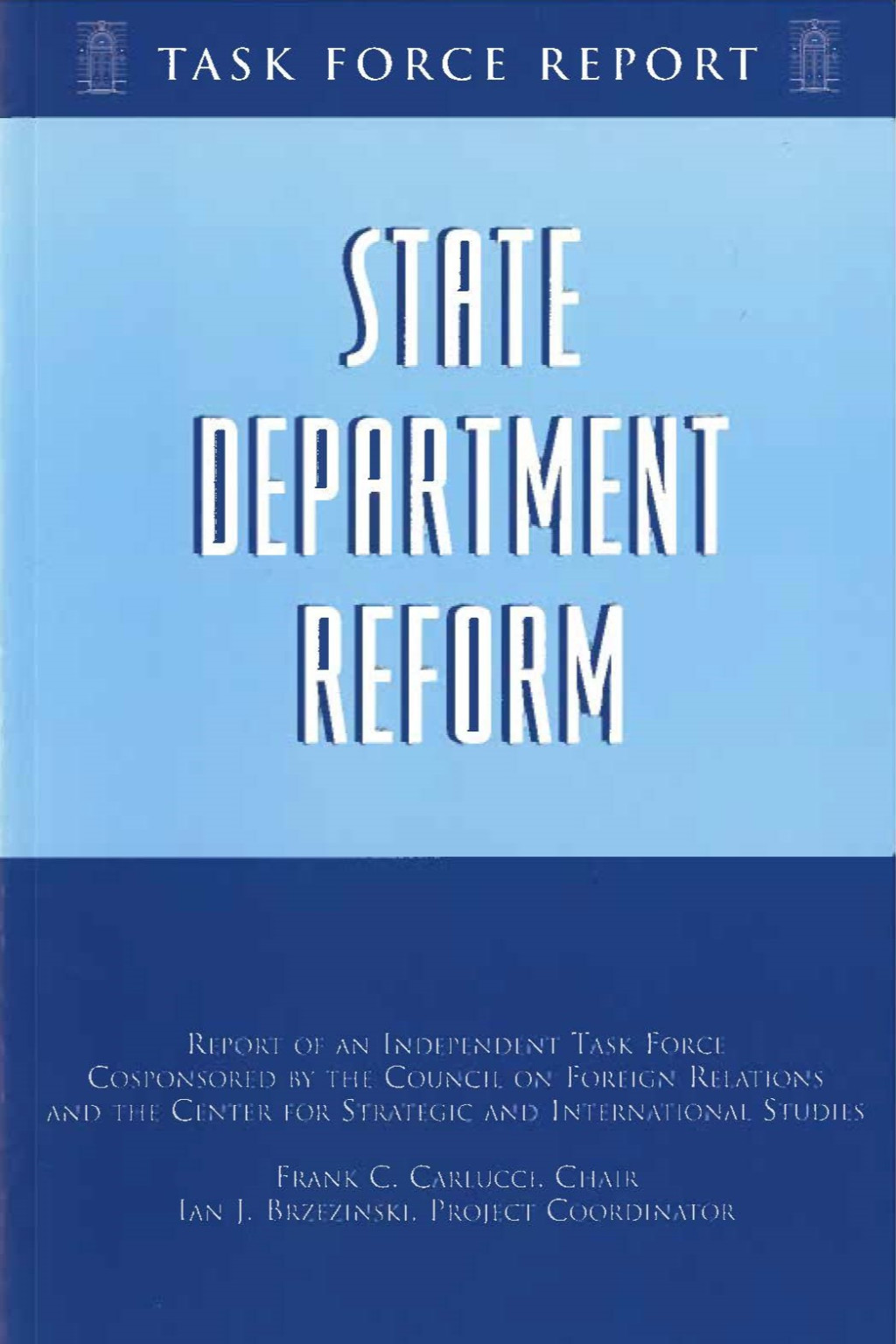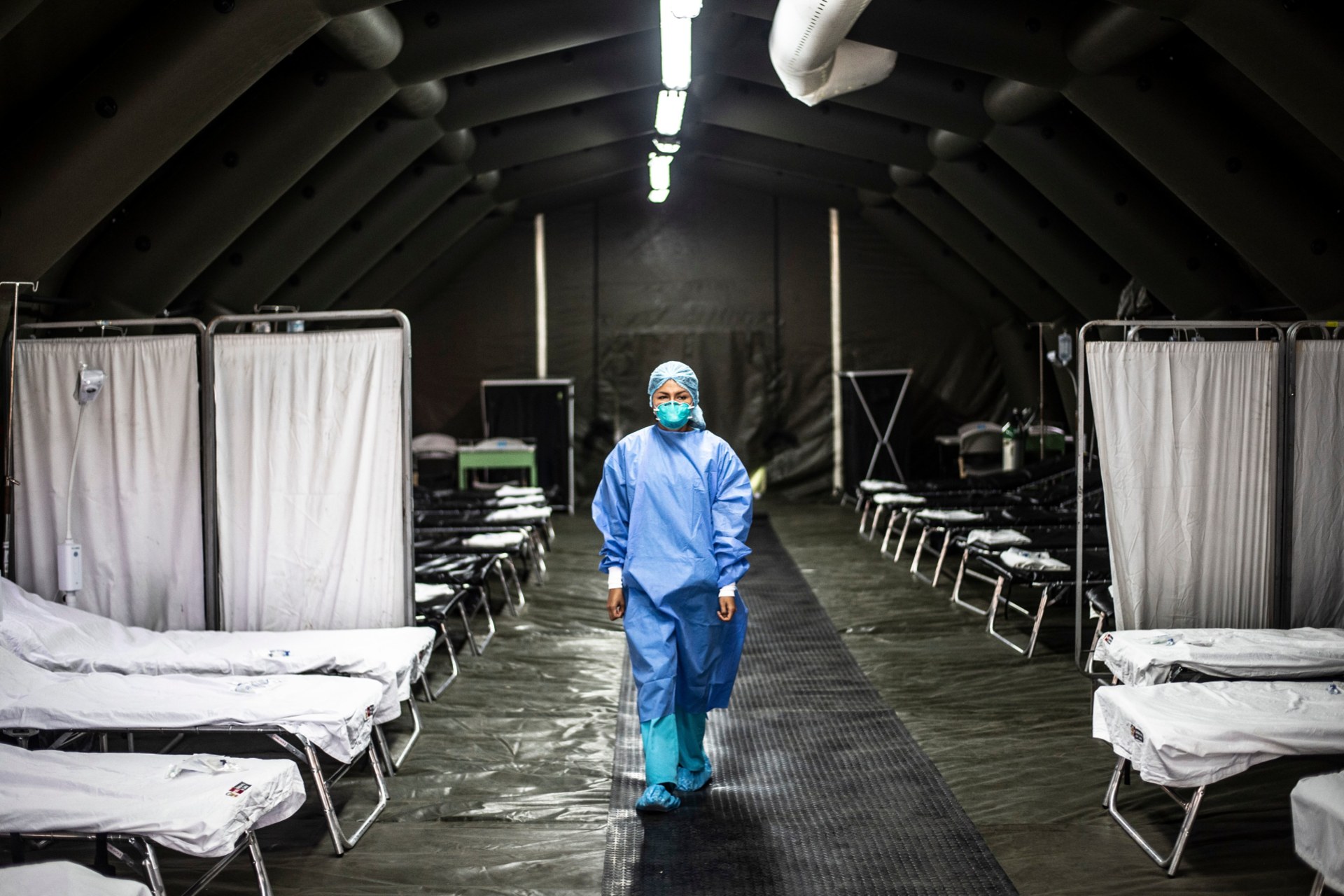Task Force Report No. #31
State Department Reform
- Frank C. CarlucciCochair
- Ian J. BrzezinskiDirector
What are Task Force Reports?
CFR sponsors Task Forces to assess issues of critical importance to U.S. foreign policy to reach bipartisan consensus on policy recommendations.
Who makes them?
Task Force members aim to reach a meaningful consensus on policy and are solely responsible for the content of their report.
Ten years after the fall of the Berlin Wall, the military and economic instruments of American power have benefited from renewed attention and resources. However, the forward edge of American national security policy, the Department of State, is in a profound state of disrepair, suffering from long-term mismanagement, antiquated equipment, and dilapidated and insecure facilities.
These deficits are not only a disservice to the high-caliber men and women who serve as part of the Department of State. They also handicap the ability of the United States to shape and respond to the opportunities and challenges of the twenty-first century. If the deterioration continues, the ability of the United States to rely on statecraft to avoid, manage, and resolve crises and to deter aggression will decline, increasing the likelihood that America will have to use military force to protect its interests abroad.
The Task Force’s purpose was unique. It did not attempt to reinvent the many constructive findings and recommendations of the numerous blue-ribbon commissions that have studied the Department of State. Instead, the Task Force synthesized these findings and recommendations into two crisp memos, one to the president and one to the secretary of state, that articulate a “resources-for-reform” strategy of concrete steps to redress the department’s shortcomings in infrastructure, human-resources policies, and budgetary management, and to recharge the department’s role in the interagency process that makes and implements U.S. national security policy. The proposed strategy rests on the assumption that, although resources will be neccessary to reform the Department of State, reform from within the department will be necessary to obtain those resources from the U.S. Congress.
Task Force Members
Task Force Members
DAVID M. ABSHIRE is President of the Center for the Study of the Presidency. He is co-founder and former President of the Center for Strategic and International Studies, and has served in government as Assistant Secretary of State, U.S. Ambassador to NATO, and as Special Counselor to President Ronald Reagan.
MARSHALL P. ADAIR is President of the American Foreign Service Association, which represents active-duty and retired members of the professional diplomatic service. He is a career Foreign Service Officer, holding the rank of Minister-Counselor,and has served overseas in Asia, Europe, and Africa.
BARRY M. BLECHMAN is the CEO of DFI International, a research and consulting firm in Washington, D.C., and Chairman of the Henry L. Stimson Center , a nonprofit research organization. He served in the U.S. Department of State as Assistant Director of the U.S. Arms Control and Disarmament Agency from 1977 to 1979.
CHARLES G. BOYD, General, U.S. Air Force (Ret.), is the Executive Director of the U.S. Commission on National Security/21st Century, a bipartisan federal commission chaired by former Senators Gary Hart (D-Colo.) and Warren Rudman (R-N.H.). He closed out his military career as Deputy Commander in Chief , U.S. European Command.
IAN J. BRZEZINSKI is a Senior Professional Staff Member of the U.S. Senate Committee on Foreign Relations, where he assists the committee chairman in matters concerning Europe and Russia. He also held positions at the National Security Council and the Department of Defense.
FRANK C. CARLUCCI is Chairman and a partner in the Carlyle Group, a Washington, D.C.–based merchant bank. He was both Secretary of Defense and National Security Adviser under President Ronald Reagan, and served as a Foreign Service Officer from 1956 to 1980.
WILLIAM J. CROWE JR. is Chairman of the Board of Advisers at Global Options, a crisis management firm. He was U.S. Ambassador to the United Kingdom (1994–97), Chairman of the president’s Foreign Intelligence Advisory Board (1993–94), and Chairman of the Joint Chiefs of Staff (1985–89).
PAULA J. DOBRIANSKY is Vice President of the Council on Foreign Relations, Director of its Washington Program, and the Council’s first George F. Kennan Senior Fellow for Russian and Eurasian Studies. She has also held high-level positions on the National Security Council Staff and the U.S. State Department.
THOMAS E. DONILON is Executive Vice President, Law and Policy, at the Federal National Mortgage Association. Previously, he was Assistant Secretary of State for Public Affairs and Chief of Staff at the State Department.
KENNETH M. DUBERSTEIN is Chairman and CEO of the Duberstein Group, Inc., an independent strategic planning and consulting company. Previously, he served as Chief of Staff (1988–89) and Deputy Chief of Staff (1987) to President Ronald Reagan, and as the Assistant and Deputy Assistant to the President for Legislative Affairs (1981–83).
RICHARD N. GARDNER is Professor of Law and International Organization at Columbia University and Counsel to Morgan, Lewis & Bockius, a global law firm. He has served as U.S. Ambassador to Italy and Spain, and as Deputy Assistant Secretary of State for International Organization Affairs.
TOBI TRISTER GATI is Senior International Adviser at Akin, Gump, Strauss, Hauer & Feld, L.L.P. She served as Special Assistant to the President and Senior Director for Russia, Ukraine, and the Eurasian States on the National Security Council staff in 1993, and as Assistant Secretary of State for Intelligence and Research until May 1997.
LEE H. HAMILTON is Director of the Woodrow Wilson International Center for Scholars in Washington , D.C. , and Director of the Center on Congress at Indiana University. He served in the U.S. House of Representatives for seventeen terms, from 1965 to 1998.
JOHN J. HAMRE is President and CEO of the Center for Strategic and International Studies. Previously, he served as U.S. Deputy Secretary of Defense (1997–99) and Undersecretary of Defense (comptroller) (1993–97).
WILLIAM C. HARROP served as a professional diplomat for thirty-nine years, including posts as U.S. Ambassador to Guinea , Kenya , Zaire , and Israel . He also served as Deputy Assistant Secretary of State for Africa and Inspector General of the State Department and the Foreign Service.
ARTHUR A. HARTMAN is a Senior Consultant at APCO Worldwide. He was a career Foreign Service Officer and served as U.S. Ambassador to France and to the Soviet Union .
CARLA A. HILLS is Chair and CEO of Hills & Company, an international consulting firm that advises U.S. companies on their trade and investment interests abroad. She served as U.S. Trade Representative in the George H.W. Bush administration, and as Secretary of Housing and Urban Development in the Ford administration.
ROBERT E. HUNTER is Senior Adviser at RAND Corporation in Washington, D.C., a member of the Defense Policy Board, and Vice Chairman of the Atlantic Treaty Association. He was U.S. Ambassador to NATO from 1993–98.
KENNETH I. JUSTER is a Senior Partner at the law firm of Arnold & Porter, where he practices international law. He previously served as the Counselor (Acting) of the U.S. Department of State, and as Deputy and Senior Adviser to the Deputy Secretary of State.
LEWIS B. KADEN is a partner at Davis Polk & Wardwell and Adjunct Professor of Law at Columbia University. He is the Chairman of the Overseas Presence Advisory Panel (OPAP).
ZALMAY M. KHALIZAD is the Corporate Chair in International Security Studies at RAND Corporation and is a member of the Board of Directors of the United States Institute of Peace. Between 1991 and 1992, he was Assistant Deputy Undersecretary of Defense for Policy Planning.
JAMES V. KIMSEY is the founding CEO and Chairman Emeritus of America Online. He is also Chairman of the Board for the Kimsey Foundation.
JESSICA TUCHMAN MATHEWS is President of the Carnegie Endowment for International Peace. From 1977 to 1979, she was Director of the Office of Global Issues on the National Security Council staff, and in 1993, she returned to government as Deputy to the Undersecretary of State for Global Affairs.
PATRICIA MCNERNEY is the General Counsel for the U.S. Senate Select Committee on Intelligence. Ms. McNerney previously served as the Majority Counsel for the U.S. Committee on Foreign Relations.
JAMIE F. METZL is a Visiting Scholar at the Carnegie Endowment for International Peace and an International Affairs Fellow at the Council on Foreign Relations. He served on the National Security Council staff under President Bill Clinton, where he spearheaded the president’s Initiative on International Public Information, and also served as Senior Coordinator for International Public Information at the U.S. Department of State, and as a Human Rights Officer for the United Nations in Cambodia.
PHYLLIS E. OAKLEY retired from the U.S. State Department in 1999, where she served as Assistant Secretary for Population, Refugees, and Migration, and as Assistant Secretary of Intelligence and Research.
PETER W. RODMAN is Director of National Security Programs at the Nixon Center. Previously, he served as Deputy Assistant to President Ronald Reagan for National Security Affairs (Foreign Policy) from March 1986 to January 1987 and then, until September 1990, under Presidents Reagan and Bush, as Special Assistant for National Security Affairs and NSC Counselor.
FELIX G. ROHATYN was U.S. Ambassador to France (1997–2000). He was also Managing Director of the investment banking firm Lazard Frères (1960–97).
STEPHEN J. SOLARZ was a Member of the U.S. House of Representatives for eighteen years, where he served on the Foreign Affairs, Intelligence, and Budget Committees. He is currently Vice Chair of the International Crisis Group, President of Solarz Associates, and a Senior Counselor at APCO Worldwide.
DANIEL L. SPIEGEL is a partner with Akin, Gump, Strauss, Hauer & Feld. He recently served as President Bill Clinton’s Ambassador to the United Nations in Geneva, and has held foreign policy positions in the U.S. State Department and the U.S. Senate.
R. JAMES WOOLSEY is a partner at the law firm of Shea & Gardner. He has served as Director of Central Intelligence, Ambassador to the Negotiation on Conventional Armed Forces in Europe Vienna (1989–91), and as Delegate-at-Large to the U.S.-Soviet Strategic Arms Reduction Talks and Nuclear and S pace Arms Talks (1983–86).
CASIMIR A. YOST is Director of the Institute for the Study of Diplomacy at Georgetown University and Marshall B. Coyne Professor in the Practice of Diplomacy. He worked for a decade on Capitol Hill, including on the staff of the U.S. Senate Foreign Relations Committee.






